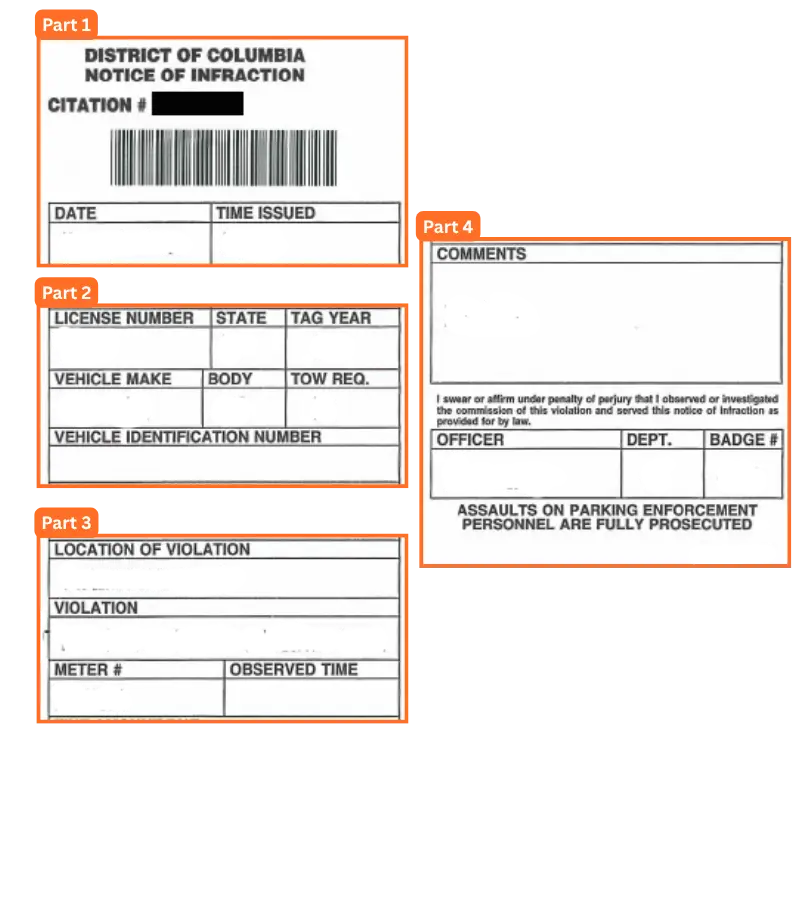Speeding is one of the most common traffic violations in Washington, D.C. Fines start at $50 for minor speeding but can exceed $500 if you’re 30+ mph over the limit. Speeding also adds points to your license and can trigger an automatic license suspension in extreme cases.
D.C. law bans all handheld phone use while driving. First offenses usually carry fines of $100, while repeat violations are higher and may add points to your record. If distracted driving causes a crash, penalties are significantly harsher.
Reckless driving in Washington, D.C. is a criminal misdemeanor. Penalties can include fines up to $1,000, 12 points on your license, and even jail time. A reckless conviction often results in license revocation as well.
Failing to stop at a red light or stop sign in D.C. typically results in a $150 fine and 2 points on your license. Automated traffic cameras are widely used in the District, and those tickets also come with steep fines.
Failure to yield to other vehicles or pedestrians in D.C. generally results in fines between $100–$250 and adds points to your license. These violations are heavily enforced in busy intersections and pedestrian-heavy areas.
Driving without insurance in Washington, D.C. is a serious offense. Penalties include fines up to $2,500, 6 license points, license suspension, and vehicle impoundment until proof of insurance is provided.
To say it simply – we are your best chance at winning. Our pro lawyers have years of experience in courts, successfully slamming thousands of tickets.
We let you know if there’s a win in sight or if your ticket’s a lost cause. You can enjoy not being taken for a ride, just simple straight talk.
Submit your ticket and step back. We offer a valet-like service, taking on the mental load of your ticket, so you don’t have to.
Forget automated responses; at Flickit, you’re guaranteed support from real, empathetic humans – every step of the way. Message us and expect a call-back!
Leave the courtrooms to TV shows. Flickit handles all the real-life legal stuff, because who has time or patience for all that drama?
By keeping your license points down, you’ll avoid your insurance premiums from rising. That’s a lot of money at stake down the line.

The top portion of the Washington, D.C. Notice of Infraction identifies your ticket in the city’s system. It begins with the official “District of Columbia Notice of Infraction” heading, followed by the unique citation number and barcode used to track your case electronically.
Beneath that, you’ll see the date and time issued. These fields show exactly when the officer created the ticket and start the clock for your response deadlines. This section is what the D.C. Department of Motor Vehicles and Office of Administrative Hearings use to locate your citation, apply penalties, and record any payments or hearing decisions. Always reference this citation number when contacting the city or using any online payment or contest system.
Part 2 focuses on the vehicle that received the infraction. It lists the license plate number, the state where the vehicle is registered, and the tag year (registration expiration). Below that, you’ll see the vehicle make and body type (for example, sedan, SUV, or truck), along with a box indicating whether the vehicle is subject to or has been placed on tow request.
In many cases, this section will also show the Vehicle Identification Number (VIN) or additional identifiers that confirm the ticket is tied to the correct car. These details are critical when challenging a ticket. If any of the vehicle information does not match your car, that discrepancy may be relevant when you or your representative contests the citation.
This portion of the D.C. ticket explains what you are being cited for and where it happened. The Location of Violation field describes the block, street, or specific address where the officer observed the infraction. The Violation line lists the applicable D.C. code section or description, such as parking in a restricted zone, an expired meter, or stopping in a no-parking area.
If the ticket is meter-related, you’ll also see a meter number and the observed time. These details show how long the vehicle was parked, when the officer observed the violation, and whether the meter had expired. Together, these entries form the factual basis of the citation and are often reviewed closely when deciding whether to pay, request a hearing, or submit evidence disputing the officer’s observations.
The final section is reserved for comments and the officer’s official certification. The comments box may include additional notes about the circumstances of the violation, such as how the vehicle was positioned, signage in the area, or other observations that support the infraction.
Below the comments, the officer signs under a statement made under penalty of perjury, confirming that they observed or investigated the violation and properly served the notice of infraction. You’ll also see the officer’s name, department, and badge number, which identify who issued the ticket. Many D.C. tickets also include a warning that assaults on parking enforcement personnel are fully prosecuted, emphasizing the legal protection given to enforcement officers while they perform their duties.